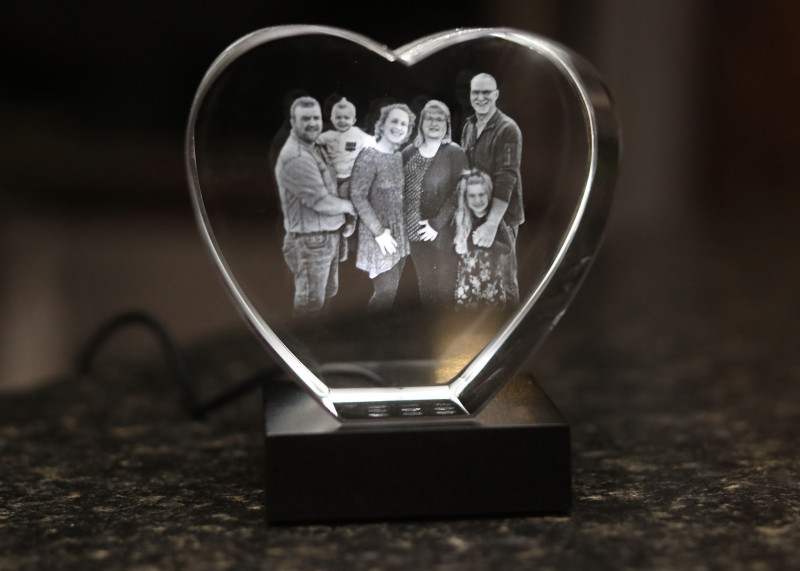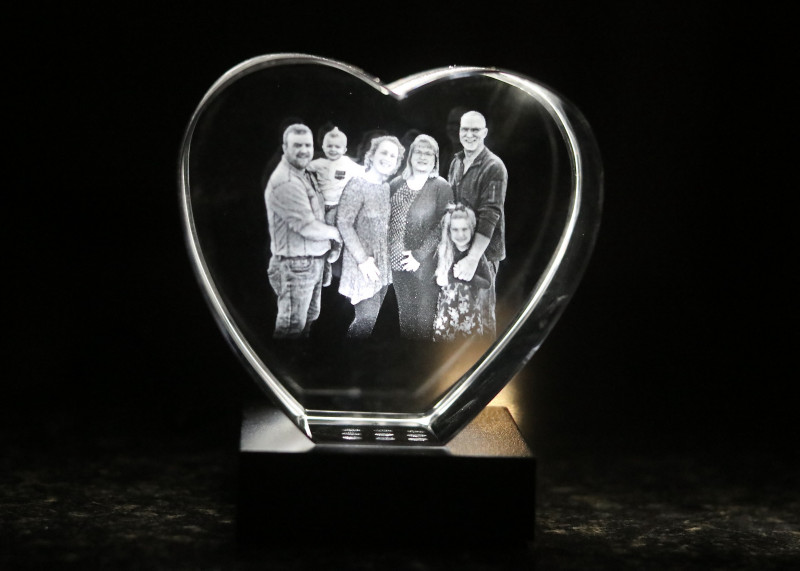Crystal Clear Memories: Unlocking The Power Of Unforgettable Moments
Crystal clear memories are the essence of our life's journey, shaping who we are and defining our experiences. These vivid recollections allow us to relive special moments, celebrate achievements, and reflect on personal growth. Whether it's a cherished family gathering, a milestone birthday, or an adventure with friends, crystal clear memories are the treasures we hold dear.
In today's fast-paced world, preserving these memories has become more important than ever. With the rise of technology and social media, people are constantly searching for ways to capture and retain moments that matter most. Crystal clear memories not only bring joy but also serve as a source of inspiration and motivation for the future.
This article delves into the science behind crystal clear memories, explores techniques to enhance memory retention, and provides practical tips to preserve these precious moments. By understanding how our brains process and store information, we can take proactive steps to create lasting memories that enrich our lives.
- Titanic Ocean Heart Necklace
- Capricorn And Scorpio Compatible
- Who Is Khloes Father
- Nicki Minaj Cardi B
- Taylor Swift Grammy Awards 2013
Table of Contents
- The Science Behind Crystal Clear Memories
- The Importance of Crystal Clear Memories
- Types of Memories and Their Characteristics
- Enhancing Memory Retention
- Techniques for Preserving Crystal Clear Memories
- The Role of Technology in Memory Preservation
- Psychological Benefits of Crystal Clear Memories
- Common Challenges in Maintaining Crystal Clear Memories
- Solutions to Overcome Memory Challenges
- The Future of Memory Preservation
The Science Behind Crystal Clear Memories
Understanding how crystal clear memories are formed involves exploring the intricate workings of the human brain. Neuroscientists have identified specific regions responsible for memory processing, including the hippocampus and amygdala. These areas work together to encode, store, and retrieve information, ensuring that significant events remain vivid over time.
How Memories Are Formed
- Encoding: The brain captures sensory input and transforms it into a format suitable for storage.
- Storage: Information is consolidated and stored in long-term memory through repeated neural connections.
- Retrieval: Memories are accessed and brought back to conscious awareness when needed.
Research shows that emotional significance plays a crucial role in creating crystal clear memories. Events associated with strong emotions, such as joy, excitement, or even fear, tend to be remembered more vividly due to the heightened activity in the amygdala.
The Importance of Crystal Clear Memories
Crystal clear memories contribute significantly to personal identity and emotional well-being. They provide a sense of continuity, helping individuals maintain connections with their past while shaping their future aspirations. These memories also foster social bonds by allowing people to share experiences and stories with others.
- How Old Was Jennifer Gray In Dirty Dancing
- Nicki Minaj Husband Charges
- Is Kylie Jenner White
- Mary Kay Letourneau Husband Now
- Neil Degrasse Tyson Young
Emotional and Psychological Benefits
- Boosts self-esteem and confidence by reminding individuals of their achievements.
- Facilitates healing and resilience during challenging times by recalling positive experiences.
- Strengthens relationships through shared memories and mutual understanding.
For many, crystal clear memories serve as a source of inspiration, encouraging them to pursue new opportunities and embrace life's adventures.
Types of Memories and Their Characteristics
Memories can be categorized into different types, each with unique characteristics and functions. Understanding these distinctions helps explain why some memories remain crystal clear while others fade over time.
Explicit vs. Implicit Memories
- Explicit Memories: Conscious recollections of facts and events, often requiring intentional effort to retrieve.
- Implicit Memories: Unconscious memories influencing behavior without conscious awareness, such as procedural skills or habits.
Sensory and Emotional Memories
- Sensory memories involve the retention of visual, auditory, or tactile impressions.
- Emotional memories are deeply tied to personal experiences and often remain vivid due to their significance.
Enhancing Memory Retention
While some people naturally possess exceptional memory capabilities, there are strategies anyone can adopt to improve memory retention and create more crystal clear memories. These techniques focus on optimizing brain function and promoting healthy cognitive habits.
Practical Tips for Memory Enhancement
- Engage in regular physical exercise to promote blood flow and oxygenation to the brain.
- Practice mindfulness and meditation to reduce stress and enhance focus.
- Adopt a balanced diet rich in antioxidants, omega-3 fatty acids, and essential nutrients.
- Get adequate sleep to allow the brain to consolidate and store information effectively.
Studies published in reputable journals like Neuroscience Letters and Journal of Cognitive Psychology support the effectiveness of these methods in improving memory performance.
Techniques for Preserving Crystal Clear Memories
Preserving crystal clear memories requires deliberate effort and the use of various tools and strategies. From traditional scrapbooking to modern digital archiving, there are numerous ways to safeguard precious moments for future generations.
Traditional Methods
- Photographs and albums provide tangible reminders of important events.
- Diaries and journals capture personal reflections and detailed accounts of experiences.
Digital Solutions
- Cloud storage services enable secure backup and easy access to digital media.
- Video recordings offer dynamic representations of memories, capturing both sight and sound.
The Role of Technology in Memory Preservation
Advances in technology have revolutionized the way we preserve and share crystal clear memories. Innovations in photography, video editing, and virtual reality offer unprecedented opportunities to recreate and relive special moments with remarkable clarity.
Innovative Tools for Memory Capture
- High-resolution cameras and smartphones allow for detailed documentation of events.
- Artificial intelligence algorithms enhance image quality and organize media collections automatically.
According to a report by the Pew Research Center, over 80% of adults use digital devices to capture and store memories, underscoring the growing reliance on technology for memory preservation.
Psychological Benefits of Crystal Clear Memories
From a psychological perspective, crystal clear memories play a vital role in maintaining mental health and emotional balance. They serve as anchors during times of uncertainty and provide comfort through nostalgia and reminiscence.
Therapeutic Applications
- Memory-based therapies, such as reminiscence therapy, help individuals with dementia reconnect with their past.
- Positive memory recall has been shown to reduce symptoms of depression and anxiety in clinical studies.
Experts recommend incorporating memory-enhancing activities into daily routines to maximize these benefits.
Common Challenges in Maintaining Crystal Clear Memories
Despite their importance, crystal clear memories are not immune to deterioration or distortion over time. Factors such as aging, stress, and cognitive decline can impact memory quality, making it essential to address these challenges proactively.
Factors Affecting Memory Clarity
- Neurological conditions like Alzheimer's disease impair memory formation and retention.
- Environmental distractions and multitasking reduce the brain's ability to encode information effectively.
Research conducted by the National Institute on Aging highlights the need for early intervention and prevention strategies to mitigate memory loss.
Solutions to Overcome Memory Challenges
Fortunately, there are evidence-based solutions available to combat memory-related challenges and preserve crystal clear memories. These interventions focus on both lifestyle modifications and medical treatments.
Strategies for Memory Improvement
- Cognitive training programs designed to sharpen mental acuity and enhance memory skills.
- Medications targeting neurodegenerative diseases to slow memory decline.
Collaboration between healthcare providers and memory specialists ensures personalized approaches tailored to individual needs.
The Future of Memory Preservation
As technology continues to evolve, the possibilities for memory preservation expand exponentially. Emerging fields such as neuroprosthetics and brain-computer interfaces hold promise for revolutionizing how we store and access memories in the future.
Exciting Developments on the Horizon
- Implantable devices capable of restoring lost memories in patients with severe cognitive impairments.
- Advanced imaging techniques enabling real-time visualization of memory processes within the brain.
While these advancements raise ethical considerations, they also offer hope for those seeking to preserve their most cherished memories indefinitely.
Conclusion
In conclusion, crystal clear memories are invaluable assets that enrich our lives and connect us to our past. By understanding the science behind memory formation, adopting effective preservation techniques, and leveraging cutting-edge technology, we can ensure these precious moments remain vibrant for years to come.
We invite you to share your thoughts and experiences in the comments section below. How do you preserve your crystal clear memories? What strategies have worked best for you? Don't forget to explore other articles on our website for more insights into memory enhancement and personal growth.
Article Recommendations
- Ending Of The Sopranos Explained
- A Philly Special Christmas
- Sabrina Carpenter Please Please Please
- Taylor Swift In Deadpool 3
- Zodiac Sign June 6



Detail Author:
- Name : Dr. Bill Cormier
- Username : owolff
- Email : everette22@emmerich.com
- Birthdate : 1987-06-02
- Address : 26530 Trey Meadow Apt. 921 South Erikaburgh, HI 85938
- Phone : 209.790.0849
- Company : Schaden, Kuphal and Cole
- Job : Insulation Worker
- Bio : Quia molestias velit praesentium harum vel rerum blanditiis. Minus officiis et distinctio laudantium corrupti perferendis voluptatibus. Repudiandae veritatis pariatur consectetur perspiciatis.
Socials
instagram:
- url : https://instagram.com/rohanp
- username : rohanp
- bio : Ullam nostrum omnis soluta laborum illum. Sint nihil et enim accusamus.
- followers : 2564
- following : 1509
linkedin:
- url : https://linkedin.com/in/rohan2006
- username : rohan2006
- bio : Esse veritatis amet odit quaerat velit sint.
- followers : 1816
- following : 1240